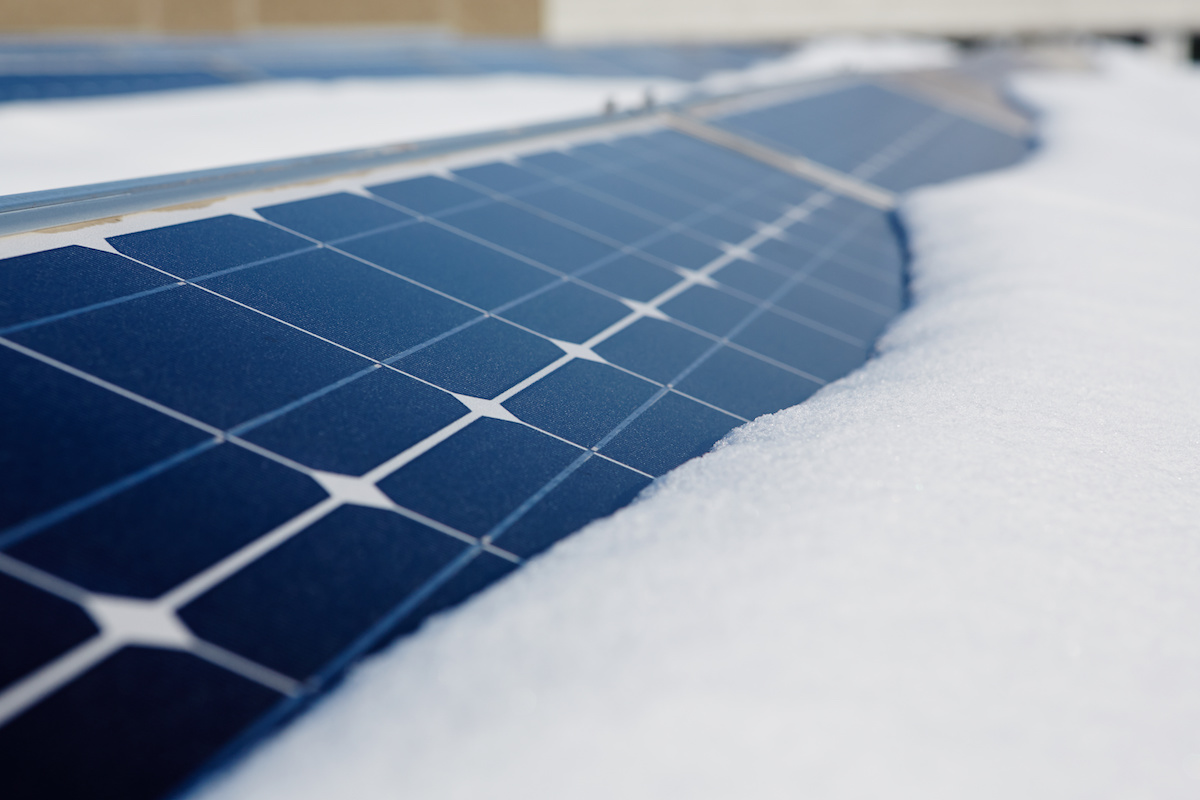Winter weather brings a host of challenges, including snow, ice, low temperatures, and cloudy skies. Solar power continues to gain popularity as both a clean and renewable energy source over the past decade. In the midst of colder temperatures and inclement weather, you may be wondering how such events may affect the efficiency of solar power.
The good news is that there are many steps that can be taken to ensure that solar panels operate at maximum efficiency, even during the coldest months of the year. From understanding how snow and ice accumulation affects energy production to the role that maintenance plays in sustaining peak performance, we will provide valuable insights and tips for making the most of your solar power system, no matter what the weather forecast holds.
How Do Solar Panels Work?
Solar panels work by converting the energy from the sun into electrical energy. They contain a series of PV (photovoltaic) cells. When sunlight strikes the cells, it knocks electrons loose from their atoms, creating a flow of electricity. This electricity is then sent to an inverter which changes it into a form that can be used in our homes and businesses. The efficiency of a solar panel depends on several factors, including the materials used to make the cells, the angle and orientation of the panel, and the amount of sunlight that strikes the panel. The ultimate result? A clean, renewable, and sustainable source of energy that can help reduce dependence on fossil fuels and lower energy costs.
Winter Weather and the Effects on Solar Power
Snow and Ice
Snow and ice accumulation on solar panels can block sun rays from reaching the photovoltaic cells, reducing the efficiency of the system. The good news is that most solar panels are designed to handle snow and ice, so efficiency usually returns to normal once the snow and ice has melted or has been cleared away. However, heavy snow and ice accumulation can be difficult to remove, especially in remote locations. In these cases, a heated panel system or a special coating can be applied to help melt snow and ice faster to ensure that the panels remain clear for the system to operate at maximum efficiency.
Low Temperature
Low temperatures during the winter months can also affect the efficiency of solar panels. Photovoltaic cells become less efficient as the temperature decreases. This is because the energy generated by the cells is proportional to the temperature of the cells. However, this decline in efficiency is usually minimal, and the daylight hours during the winter months can offset the loss in efficiency. Solar panels are also designed to operate in a wide range of temperatures, so they are not likely to be affected by the cold winter weather.
Sun Angle
The angle of the sun also plays a role in the efficiency of solar power during the winter. The sun is lower in the sky during the winter months, so it’s possible for shadows from buildings and trees to block more of the sun’s rays, reducing the amount of energy generated by the system. This can reduce efficiency, but the impact may be lessened by installing solar panels on a south-facing roof with an angle that maximizes sun exposure during the winter months. A properly angled solar panel system can significantly improve the efficiency of the system, even during the winter months.
Cloud Cover
Grey, cloudy skies can be a constant during the winter months. Cloud cover is another factor that can affect the efficiency of solar power systems during the winter. When the sky is overcast, less sunlight reaches the solar panels, reducing the amount of energy generated by the system. However, this effect can be mitigated by using high-efficiency solar panels that are able to generate energy even in low light conditions. Furthermore, many solar power systems are connected to the grid, allowing them to draw energy from the grid when necessary. This ensures that the system operates at utmost efficiency, even on cloudy winter days.
Maintenance
Maintenance is key to ensuring that solar power systems operate at their highest efficiency, even during the winter months. Regular cleaning and inspection of the panels can help prevent snow and ice accumulation and reduce the risk of damage from falling branches or other debris. In addition, ensuring that the panels are properly aligned and free of debris can increase the efficiency of the system, especially during the winter months.
Snow and ice accumulation, low temperatures, cloud cover, and the angle of the sun can all play a role in decreasing efficiency, but these effects can be alleviated with proper installation and maintenance of the solar panels. Despite these factors, solar power remains a reliable and sustainable source of energy, even during the winter months. Winter may almost be over, but it’s never too late to save energy and money.
CleanSky Energy is a retail energy company offering 100% renewably sourced electricity and carbon offset natural gas plans to residential and business customers. To learn more about our plans and honest rates visit cleanskyenergy.com.

